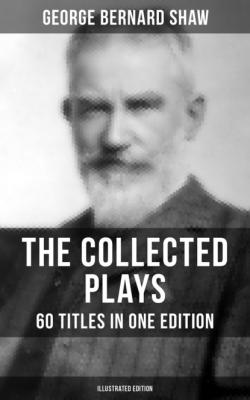ТОП просматриваемых книг сайта:
The Collected Plays of George Bernard Shaw - 60 Titles in One Edition (Illustrated Edition). GEORGE BERNARD SHAW
Читать онлайн.Название The Collected Plays of George Bernard Shaw - 60 Titles in One Edition (Illustrated Edition)
Год выпуска 0
isbn 9788027202218
Автор произведения GEORGE BERNARD SHAW
Жанр Языкознание
Издательство Bookwire
Why dost thou urge them both upon me now?
Presume not on thine age and on thy nastiness.
Vanish, and promptly.
MELLISH. Can I leave thee here
Thus thinly clad, exposed to vernal dews?
Come back with me, my son, unto our lodge.
CASHEL. Within this breast a fire is newly lit
Whose glow shall sun the dew away, whose radiance
Shall make the orb of night hang in the heavens
Unnoticed, like a glow-worm at high noon.
MELLISH. Ah me, ah me, where wilt thou spend the night?
CASHEL. Wiltstoken’s windows wandering beneath,
Wiltstoken’s holy bell hearkening,
Wiltstoken’s lady loving breathlessly.
MELLISH. The lady of the castle! Thou art mad.
CASHEL. ’Tis thou art mad to trifle in my path.
Thwart me no more. Begone.
MELLISH. My boy, my son,
I’d give my heart’s blood for thy happiness.
Thwart thee, my son! Ah, no. I’ll go with thee.
I’ll brave the dews. I’ll sacrifice my sleep.
I am old — no matter: ne’er shall it be said
Mellish deserted thee.
CASHEL. You resolute gods
That will not spare this man, upon your knees
Take the disparity twixt his age and mine.
Now from the ring to the high judgment seat
I step at your behest. Bear you me witness
This is not Victory, but Execution.
[He solemnly projects his fist with colossal force
against the waistcoat of Mellish who doubles up like
a folded towel, and lies without sense or motion.
And now the night is beautiful again.
[The castle clock strikes the hour in the distance.
Hark! Hark! Hark! Hark! Hark! Hark! Hark! Hark! Hark! Hark!
It strikes in poetry. ’Tis ten o’clock.
Lydia: to thee!
[He steals off towards the castle. Mellish stirs and groans.
ACT II
Scene I
London. A room in Lydia’s house
Enter Lydia and Lucian
LYDIA. Welcome, dear cousin, to my London house.
Of late you have been chary of your visits.
LUCIAN. I have been greatly occupied of late.
The minister to whom I act as scribe
In Downing Street was born in Birmingham,
And, like a thoroughbred commercial statesman,
Splits his infinities, which I, poor slave,
Must reunite, though all the time my heart
Yearns for my gentle coz’s company.
LYDIA. Lucian: there is some other reason. Think!
Since England was a nation every mood
Her scribes have prepositionally split;
But thine avoidance dates from yestermonth.
LUCIAN. There is a man I like not haunts this house.
LYDIA. Thou speak’st of Cashel Byron?
LUCIAN. Aye, of him.
Hast thou forgotten that eventful night
When as we gathered were at Hoskyn House
To hear a lecture by Herr Abendgasse,
He placed a single finger on my chest,
And I, ensorceled, would have sunk supine
Had not a chair received my falling form.
LYDIA. Pooh! That was but by way of illustration.
LUCIAN. What right had he to illustrate his point
Upon my person? Was I his assistant
That he should try experiments on me
As Simpson did on his with chloroform?
Now, by the cannon balls of Galileo
He hath unmanned me: all my nerve is gone.
This very morning my official chief,
Tapping with friendly forefinger this button,
Levelled me like a thunderstricken elm
Flat upon the Colonial Office floor.
LYDIA. Fancies, coz.
LUCIAN. Fancies! Fits! the chief said fits!
Delirium tremens! the chlorotic dance
Of Vitus! What could any one have thought?
Your ruffian friend hath ruined me. By Heaven,
I tremble at a thumbnail. Give me drink.
LYDIA. What ho, without there! Bashville.
BASHVILLE [without]. Coming, madam.
Enter Bashville
LYDIA. My cousin ails, Bashville. Procure some wet. [Exit Bashville.
LUCIAN. Some wet!!! Where learnt you that atrocious word?
This is the language of a flower-girl.
LYDIA. True. It is horrible. Said I “Some wet”?
I meant, some drink. Why did I say “Some wet”?
Am I ensorceled too? “Some wet”! Fie! fie!
I feel as though some hateful thing had stained me.
Oh, Lucian, how could I have said “Some wet”?
LUCIAN. The horrid conversation of this man
Hath numbed thy once unfailing sense of fitness.
LYDIA. Nay, he speaks very well: he’s literate:
Shakespear he quotes unconsciously.
LUCIAN. And yet
Anon he talks pure pothouse.
Enter Bashville
BASHVILLE. Sir: your potion.
LUCIAN. Thanks. [He drinks.] I am better.
A NEWSBOY [calling without]. Extra special Star!
Result of the great fight! Name of the winner!
LYDIA. Who calls so loud?
BASHVILLE. The papers, madam.
LYDIA. Why?
Hath ought momentous happened?
BASHVILLE. Madam: yes. [He produces a newspaper.
All England for these thrilling paragraphs
A week has waited breathless.
LYDIA. Read them us.
BASHVILLE [reading]. “At noon to-day, unknown

